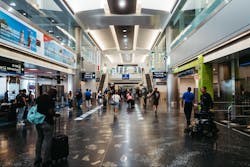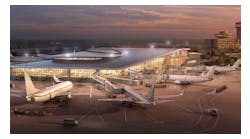Many people don’t realize, but anyone that works at the airport is exempt from screening.
Whether they are gassing up the planes or helping customers at the gift shop, employees are not required to go through any sort of security screening beyond a background check. Until now.
After a rise in illegal activity among airport workers, the US Transportation Security Administration has mandated new rules to prevent criminals from infiltrating restricted areas.1
Despite pushback from lawmakers, the TSA is holding firm on the new mandate, which will come into effect next year.2
It’s clear employee screening is needed following a string of incidents involving airport staff. Earlier this week, three employees of companies at Lisbon Airport were arrested for drug trafficking. The arrests were made while the suspects were in the act, resulting in the confiscation of a significant quantity of cocaine.
A few days prior, seven employees at Schiphol Airport were arrested for their involvement in international drug smuggling operations at the airport.
New details also just emerged about the $20 million gold heist that took place at Toronto Pearson Airport in April,3 one the largest thefts in Canadian history, which remains unsolved.
Fortunately, AI security company Liberty Defense Holdings (TSXV:SCAN) (OTCQB:LDDFF) is already beginning to implement its HEXWAVE™ system at North American airports to enhance screening for both passengers and staff.
Liberty Defense’s HEXWAVE™ system uses a combination of AI, electromagnetic waves, and 3D imaging to effectively scan and identify potentially hazardous items, such as metal, 3D-printed plastic guns, powders, and liquids. The process is remarkably swift, requiring employees to pass through a contactless walkthrough portal without having to remove their keys or cell phones.
AI-Enhanced Walk-Through Security Detection
Liberty Defense Holdings is a leading technology provider specializing in AI-based next-generation detection solutions for safeguarding secure locations against prohibited weapons and various threats.
The company has continued to sign partnerships in the aviation sector, with Denver International being the latest airport to begin a week-long trial of Liberty Defense's HEXWAVE to conduct screening on its workers.
Trials of this innovative technology are also underway at airports in California and New Hampshire, while Toronto Pearson, Canada's largest airport has already acquired and implemented this technology.
Looking ahead, there is a federal mandate set to take effect by April 2026, requiring major airports throughout the United States to implement explosive detection screening for aviation personnel.
Liberty Defense (TSXV:SCAN) (OTCQB:LDDFF) also just announced an exclusive distribution partnership with OSI Systems’ subsidiary Rapiscan Systems to sell and service HEXWAVE™ internationally in security and aviation markets.
OSI Systems has placed an initial order for 20 HEXWAVE systems to meet early customer interest, and Liberty Defense is scheduled to deliver the first five units by the end of 2023. This agreement allows Rapiscan to add the HEXWAVE walkthrough people screening system to its range of security products and services.
Rapiscan Systems is recognized for providing screening technologies that assist governments, defense agencies, and various industries in safeguarding against threats like terrorism, and preventing the smuggling of drugs, weapons, and contraband. With a global network for service and support, Rapiscan Systems ensures that maintenance and assistance for the HEXWAVE systems will be readily available wherever they are deployed.
“We are thrilled to join forces with Rapiscan, a worldwide leader in the security industry, and look forward to expanding the reach of HEXWAVE into more countries internationally,” said Bill Frain, CEO of Liberty Defense. “Over the past several months, we have seen the demand increase significantly for HEXWAVE for enhanced screening at checkpoint applications, and it was important for Liberty to enter into this important agreement with Rapiscan to meet that demand.”
This agreement significantly expands Liberty's global presence, encompassing the European, Middle Eastern, African, and Asia/Pacific regions, including Australasia, for HEXWAVE market penetration.
In addition, Liberty Defense recently received a $1.25 million contract from the Transportation Security Administration (TSA), which includes options for a total value of up to $3.86 million. This Research and Development contract will provide TSA with Open Architecture (OA) software, end-to-end engineering development, and the enhancement of the High-Definition Advanced Imaging Technology (HD-AIT) Wideband Upgrade Kit. The goal is to improve threat detection and enhance the passenger experience.
As an agency of the US Department of Homeland Security, the TSA is responsible for airport security screening across the United States. The TSA's On-Person Screening program focuses on detecting a wider range of threats with fewer false alarms and reduced physical contact. Open Architecture, according to the TSA, is a technology design approach that ensures interoperability across tools and platforms, regardless of the technology designer, manufacturer, or supplier, through the use of widely accepted standards.



